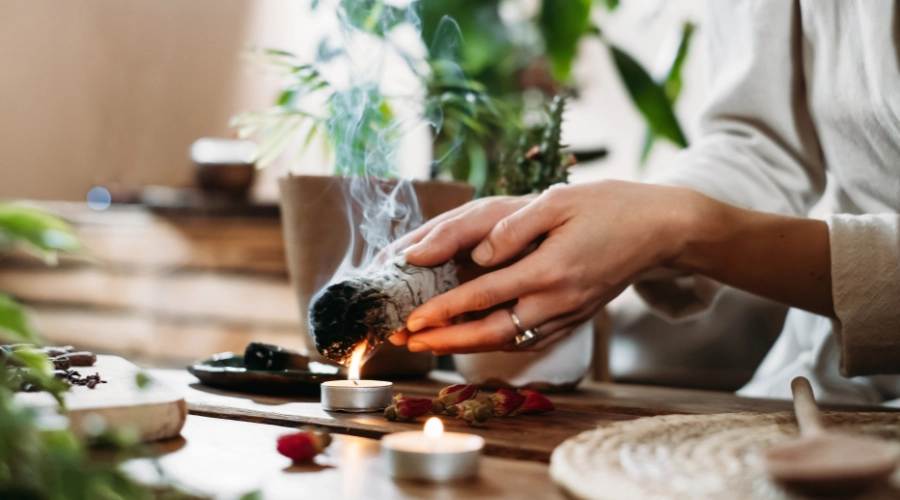
You know that feeling when someone genuinely thanks you for something small? That unexpected warmth that spreads through your chest? That’s not just a pleasant social interaction—it’s your body responding to one of the most powerful wellness practices available to us, completely free.
As the days grow shorter and the air turns crisp, there’s something about autumn that naturally pulls us inward. We start craving comfort, connection, and meaning. This seasonal shift isn’t just poetic—it’s the perfect biological moment to cultivate a gratitude practice that can literally rewire your brain for greater happiness.
And the science backs this up in ways that might surprise you.
What Gratitude Actually Does to Your Body
Writer Annie Dillard once wrote, “Anything you do not give freely and abundantly becomes lost to you. You open your safe and find ashes.” She was talking about creative generosity, but she could have been describing gratitude itself—the act of freely acknowledging the abundance already present in our lives.
Robert Emmons, Ph.D., a leading psychology professor at the University of California and the foremost scientific expert on gratitude, has conducted extensive research that reveals something remarkable: gratitude isn’t just a nice feeling, it’s a practice that creates measurable changes in your physical and mental health.
His research with thousands of participants found that people with consistent gratitude practices reported:
Physical Benefits
- Fewer aches and pains throughout the body
- Increased motivation for health self-care and exercise
- Better quality sleep and faster time to falling asleep
Mental & Emotional Shifts
- Increased feelings of positivity, joy, and optimism
- Higher energy levels and greater alertness
- Reduced symptoms of depression and anxiety
Social Connection
- Increased compassion and empathy for others
- More meaningful social interactions
- Decreased feelings of loneliness and isolation
What’s particularly fascinating is that gratitude doesn’t just make you feel better in the moment—it actually changes how your brain processes information over time. Regular gratitude practice strengthens neural pathways associated with positive thinking, making it easier to notice and appreciate good things in your life.
The Gratitude Practice That Actually Sticks
Here’s the truth about gratitude practices: they only work if you actually do them. And most people abandon their gratitude journals after a week because they feel forced or performative.
The secret? Find a practice that feels natural to how you already move through the world.
Morning Ritual Approach
Some people thrive with structure. If that’s you, try starting each day by speaking aloud three things you’re grateful for before you even get out of bed. One member of The Alchemist’s Kitchen community shared: “Every morning upon waking, I speak the words of the things I am grateful for.” This vocal acknowledgment activates different neural pathways than just thinking grateful thoughts.
🌱 Plant Ally: Consider pairing this practice with a morning adaptogenic elixir from our Mood Enhancers collection. Herbs like holy basil and lion’s mane support mental clarity and emotional balance, creating the perfect foundation for gratitude.
Body-Based Practice
For those living with chronic pain or health challenges, gratitude can feel complicated. How do you feel grateful for a body that hurts? One community member offered this wisdom: “I have a morning gratitude practice that begins with a reading and then a visit to my altar and then I begin with myself and send appreciation to all the things my body does right for me each day.”
This is profound—focusing not on what your body can’t do, but on the countless invisible miracles it performs every moment. Your heart beats. Your lungs fill. Your eyes translate light into meaning. These aren’t small things.
🌱 Plant Ally: Support your body’s daily work with targeted herbal remedies for pain relief that work with your system, not against it. When physical discomfort eases, gratitude flows more naturally.
Mindful Moment Method
“I practice gratitude by being present as often as possible,” shared another community member. “It is when I stop distracting myself with the past or future, with lists and chores; when I simply notice how incredible this world is and what a blessing my loved ones are to me—it is in these moments that I experience true gratitude.”
This approach doesn’t require journaling or scheduling. It requires catching yourself in the middle of an ordinary moment and really noticing it. The way morning light hits your coffee cup. The sound of someone you love laughing. The feeling of a deep breath.
Why Your Words Matter More Than You Think
Here’s something most people don’t realize: the language you use every day is either training your brain toward gratitude or away from it.
Mindful speech isn’t about forcing positivity or bypassing genuine struggles. It’s about noticing the small linguistic habits that shape your perception. Do you say “I have to go to work” or “I get to work today”? Do you thank the barista, the delivery person, the person who held the door?
These aren’t just niceties—they’re neural training. Each genuine “thank you” strengthens your brain’s gratitude circuits, making it easier to notice things worth appreciating.
One community member put it beautifully: “By telling my loves how they make the world a beautiful place, by saying thank you often and by exclaiming my love for the natural world.”
Ready to deepen your gratitude practice?
Visit our Soho botanical dispensary and speak with one of our resident herbalists about plant allies that support emotional openness and mental clarity. Our herbal counter is designed specifically to help you find the remedies that work with your unique system.
Gratitude-Breath Connection
“Breathing deeply to remember each time my lungs fill is a gift from Mother Earth,” shared one thoughtful community member. This simple practice connects gratitude to the most fundamental act of being alive.
Try this right now: Take a slow, deep breath. Feel your lungs expand. Notice that you didn’t have to think about it—your body just knew how to receive that gift of oxygen and transform it into energy.
That’s worth acknowledging.
When you pair breathwork with gratitude, you’re engaging both your nervous system and your cognitive processing. It’s a full-body practice that can shift your state in under a minute.
🌱 Plant Ally: Enhance your breathwork and meditation practices with plant-based remedies that support calm focus. Herbs like passionflower and California poppy help quiet mental chatter so you can drop into genuine presence.
Creative Gratitude: When Words Aren't Enough
Not everyone processes gratitude through words. Some people need to move, create, or express it physically. “By expressing it in creative ways from music, to art, to dance and then giving that to someone I love,” one community member shared.
This is gratitude as offering. When appreciation becomes so full that it needs to pour out in creative expression, you’re experiencing gratitude at its most potent.
Maybe your gratitude practice looks like:
- Dancing in your kitchen to a song that makes you feel alive
- Painting something beautiful for someone you love
- Cooking a nourishing meal with intention and care
- Writing a poem that captures a moment of wonder
There’s no hierarchy here. A gratitude journal isn’t inherently “better” than a grateful dance. What matters is that your practice feels true to you.
Building Your Personal Gratitude Practice This Season
The most liberating thing about gratitude? There’s no wrong way to do it. As one community member wisely noted: “Gratitude is probably the most liberating aspect of life. I practice gratitude through meditating or intentionally thinking about the beautiful parts of life. Gratitude for me is an internal process that I’ve found to be necessary for well-being.”
Here’s how to create a practice that actually sticks:
- Start ridiculously small. Don't commit to a 30-minute morning gratitude ritual if you can barely get out of bed. Start with one breath, one thought, one acknowledgment.
- Anchor it to something you already do. Gratitude while making coffee. Gratitude while brushing your teeth. Gratitude while walking to the subway. Use existing habits as triggers.
- Make it multisensory. Engage more than just your thinking brain. Light a candle. Hold a meaningful object. Sip an intentionally crafted elixir from our Elixir Bar. The more senses involved, the deeper the practice embeds.
- Track what shifts. You don't need to journal daily, but notice over time: Are you sleeping better? Feeling more connected? Experiencing more joy in small moments? Let the results motivate you.
Plant Allies That Support Gratitude
At The Alchemist’s Kitchen, we’ve spent years understanding how specific plants can support emotional and spiritual practices. Gratitude isn’t just a mental exercise—it’s an embodied state that requires nervous system regulation, mental clarity, and heart opening.
Consider exploring:
- Cacao preparations for heart-opening ceremonial practices
- Adaptogenic blends that reduce stress and support emotional balance
- Calming herbs that quiet mental chatter so gratitude can emerge naturally
Our resident herbalists at our 119 Crosby Street location can help you find the specific allies that support your unique gratitude journey. Schedule a consultation to create a personalized plant protocol.
Your Invitation This Season
As we move deeper into autumn and toward the season of gathering and reflection, consider this your invitation to experiment with gratitude—not as another item on your self-improvement to-do list, but as a genuine inquiry into what you already have.
Annie Dillard was right. What we don’t give freely becomes lost to us. But the reverse is also true: what we acknowledge with genuine gratitude multiplies. Not magically, but practically—because gratitude trains your brain to notice more of what’s already working, already beautiful, already enough.
This season, we’re holding space for gratitude practices at our Soho locations. Join us for seasonal workshops and transformational events that combine ancient wisdom with modern science. Experience how plant medicine, community, and intention can deepen your capacity for genuine appreciation.
Stop by our botanical dispensary at 119 Crosby Street (Mon-Sat 11am-7pm, Sun 11am-6pm) or our Elixir Bar at 117 Crosby Street to experience gratitude-supporting plant allies firsthand. Our herbalists are here to help you build practices that actually feel good.
Because gratitude shouldn’t feel like work. When you find the right practice, supported by the right plants, it feels like coming home to yourself.
